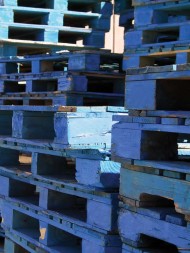 EMS (UK) Ltd has come into its own in the current economic climate as Britain’s biggest provider of management services for pallets, trays and crates. The initials ‘EMS’ stand for equipment management solutions, and in 100% of cases EMS pay for themselves in cost savings within a year.
EMS (UK) Ltd has come into its own in the current economic climate as Britain’s biggest provider of management services for pallets, trays and crates. The initials ‘EMS’ stand for equipment management solutions, and in 100% of cases EMS pay for themselves in cost savings within a year.
Set up by two former Chep managers, William Bell and Terry Costigan, EMS’s client base has grown from just two initially to 48 companies looking to EMS to help them get the best from their involvement with their equipment pools. Driving this growth, FMCG companies of all sizes are seeing their sales plateau and profits squeezed in the recession, and are looking closely at aspects of their business where costs are eroding revenue. Astute managers in these businesses recognise that pallets and other returnable equipment are an area where they can make rapid savings by outsourcing the micromanagement of this equipment to an independent expert. EMS director William Bell spoke to Warehouse & Logistics News.
Warehouse & Logistics News – What specific pallet management services do you offer?
We offer Account Health Check, Problem Resolution and Turnkey Pallet Management. With Account Health Check we visit all sites associated with the pallet account, and audit the account just as their equipment provider would do. We feed back the areas of strength and more importantly, of weakness where revenue may be lost. The customer can make financial decisions based on the findings and better understand their account.
Problem Resolution is when companies have a specific problem, such as a large invoice for losses from their equipment provider. EMS has saved companies over £3,000,000 in alleged losses from their pallet providers by using our knowledge of how the system works and which party is liable for certain shortcomings. Companies should not accept their provider’s findings, and should get an independent view.
 Turnkey Pallet Management is our most popular product. It does what it says – “hand over all elements of the pallet account to EMS Ltd and the account will be managed to its optimum.” This includes day to day running of the account, dealing with the equipment provider, hauliers, handling the paper movements of the pallets, reconciling invoices, raising queries, producing reports and budgets and handling all meetings with Chep, IPP or LPR. The customer then has the knowledge to know which current practices are costly and which are efficient. They make key decisions on this information to their benefit.
Turnkey Pallet Management is our most popular product. It does what it says – “hand over all elements of the pallet account to EMS Ltd and the account will be managed to its optimum.” This includes day to day running of the account, dealing with the equipment provider, hauliers, handling the paper movements of the pallets, reconciling invoices, raising queries, producing reports and budgets and handling all meetings with Chep, IPP or LPR. The customer then has the knowledge to know which current practices are costly and which are efficient. They make key decisions on this information to their benefit.
Our unique selling point is that we are ex-Chep and have detailed knowledge of their old and new systems. We know the reports used and how to use them for the customer’s benefit.
WLN – Do you offer specific software applications to help clients manage their pallets better?
All our customers benefit from using our Generator software. If readers are using the Chep Portfolio system to declare movements, they will know how time consuming and cumbersome this process is.
Generator is our online file convertor and pallet-processing tool, which simplifies and speed up reporting pallet flows to Chep and other equipment providers. It eliminates the need to use systems such as Portfolio. It takes despatch data in an Excel spreadsheet and converts up to 64,000 lines of data at the click of a button. This saves Portfolio users hundreds of man-hours annually, and pays for itself.
EMS uses its own bespoke pallet management system called Babia, designed by us and totally specific for pallet management. As the equipment providers change their systems, we constantly update ours.
WLN – What other returnable equipment do you manage?
As companies and retailers scrutinise their carbon footprint, use of crates is increasing at the expense of cardboard. These crates are owned by companies such as Salvesens, Linpac and Chep, depending on the retailer being served. The rules are the same. The renting company must manage these crates effectively and declarations made and invoices reconciled. As with pallets, the equipment balance on the account must be regularly sense checked against stock to ensure no flows going unreported. If mismanaged, the potential liability is huge. We manage crates for large numbers of UK companies, dealing with all the providers.
WLN – When did you set up EMS, and what were you doing before?
![]() EMS was set up in January 2003. We both worked for Chep immediately before starting the business. I previously worked for Nestlé for over 10 years and Terry was with Kerry Foods. We were very customer orientated and were surprised at many companies’ perception of their pallet equipment providers. Our idea was to offer to do companies’ pallet management, acting as a service provider who did the day-to-day work, bringing our knowledge and expertise to bear and attending all meetings and negotiations. This was a very important aspect as it ensured knowledge on both sides of the negotiating table, not just one.
EMS was set up in January 2003. We both worked for Chep immediately before starting the business. I previously worked for Nestlé for over 10 years and Terry was with Kerry Foods. We were very customer orientated and were surprised at many companies’ perception of their pallet equipment providers. Our idea was to offer to do companies’ pallet management, acting as a service provider who did the day-to-day work, bringing our knowledge and expertise to bear and attending all meetings and negotiations. This was a very important aspect as it ensured knowledge on both sides of the negotiating table, not just one.
WLN – What led to you setting up EMS? Who were your first customers?
Whilst working for Chep and coming from very customer focused FMCG backgrounds, we were surprised at the level of knowledge and understanding of pallet pooling in the FMCG trade. We also saw a lot of overspend and mismanagement as we worked with companies. The complexity of managing a pallet pool effectively was difficult for certain staff, as it was perhaps only 10-15% of their job and no proper training had ever been given. Our first customer was a fresh produce supplier in Northern Ireland, with severe problems on their account. We highlighted these and addressed them with the equipment provider, and reduced their pallet spend dramatically. We also secured the management for a large distribution and marketing company, followed by a major 3PL, both with very inflated balances. Our forensic analysis showed a huge number of pallets transferred on their accounts incorrectly. As with all our customers, detailed control procedures were drawn up for pallets despatched and received, meetings took place with the equipment provider and the accounts were brought into line. This did not happen overnight, as the equipment provider took 18 months to go through what we found and correct the errors.
WLN – Where are you based? Do you have any other offices? How many staff do you have?
Our main office is in Leicester, but we also have offices in Belfast and Dublin, all carrying out equipment management. We currently have a team of 10. This has grown 20% in the last year and at current growth levels, we should have 15 by the end of 2010.
WLN – How big is EMS in terms of the number of pallet transactions you manage? How fast are you growing?
EMS does not judge its size on the amount of pallet flows. Although we manage many millions of flows per annum, we judge our size on the amount of customers we have. We currently have 48 customers with 3 more in negotiations. Some customers have very specific requirements, using two pallet pools, Chep and IPP, and also using crates, co-packers and hauliers. All these movements need to be tracked and managed efficiently. Last year EMS grew 45% in revenue terms.
WLN – What can you achieve on behalf of customers that their in house logistics people can’t?
 We want customers only to pay for what they use, without any losses. This should be the equipment providers’ objective too, so they should be happy EMS manages accounts, as their equipment is looked after very well!
We want customers only to pay for what they use, without any losses. This should be the equipment providers’ objective too, so they should be happy EMS manages accounts, as their equipment is looked after very well!
What EMS primarily provides is knowledge. Most in house logistic teams don’t have our depth of understanding. The other important aspect we bring is focus. Sometimes it boils down to knowing what your core business is. In house logistics teams are mainly focused on getting the product to market in full and on time. Our focus is solely managing equipment for our customers. This removes this responsibility from in house teams and allows them to concentrate on their core business.
WLN – How do you differ from other pallet management providers?
Being ex-Chep and having worked under both hire ledger and SAP management systems, we have a very detailed knowledge of how pallet pooling works from both sides – renter and provider. EMS will attend every meeting with the equipment provider, and physically handle all audits, including counting the pallets if necessary. We are very hands on with our customers, which they value highly.
WLN – Do you cover the whole UK? What about Ireland and continental Europe? Any plans to offer your services elsewhere?
Yes, our split is 65% UK & 35% Ireland. We have worked in Europe for customers in Austria, Italy, France and Spain. We can operate anywhere as once the control procedures are drawn up, everything flows to us via the Internet.
WLN – Can you name some of the companies you work for, and talk about what you do for them?
If we take the Tayto Group for example, they own a number of businesses, Golden Wonder, Red Mill Snacks, Tayto NI Ltd and Real Crisps. All have factories and use 3PLs and two pallet pools, Chep and IPP. EMS micromanage this business at factory and warehouse level to ensure all despatch data is captured and its correct pallet type is recorded. The balances are sense checked weekly to ensure all data is captured and as a result, the Tayto Group has its pallet providers working in competition. Commercial flows can be switched from Chep to IPP or vice versa, depending on the price and quality of pallets.
Another customer is Beiersdorf (Nivea). Again, following a quality issue on pallets, we now run two pools, using IPP for specific flows where quality has been a concern and Chep for others. Again, Beiersdorf has benefited from our micromanagement.
Maxxium, the drinks company, has a complicated network of pallet flows. EMS mapped out every single flow and assigned specific control procedures to ensure total management, which has resulted in a complicated pallet network now running smoothly. Other customers include Red Bull UK and Foster’s Wines.
Taking the complex business of pallet management off our customers’ hands leaves them free to focus on their core business, secure that their pallets are being used as cost effectively as possible.
WLN – Are there any particular industry sectors you specialise in?
We currently work in all sectors – fresh produce, wines and spirits, beers, health and beauty, snack foods, confectionery, beverages, meat processing, industrial manufacturing and 3PL/Haulage.
WLN – How can a company tell whether it needs to outsource its pallet management?
There are a number of questions decision makers need to ask themselves:
– Are you comfortable with the monies currently being spent on rental?
– Do you fully understand what you are paying for?
– Is your budget accurate?
– Does your current pallet management system have the knowledge, focus, control and attention to detail to micro manage your requirements
– Do you thoroughly reconcile every detail on your equipment invoice?
If the answer is no to any of these, the company could benefit from our services. Here are some other diagnostic questions:
– Are you incurring charges for Channel pricing such as NCD, LVD or LDCs?
– Have you ever paid Lost Equipment Charges?
– Is your equipment balance too high?
– Are you owed many pallets by hauliers/customers?
– Are you concerned when equipment audits come around?
If the answer is yes to any of these, then the company could benefit from using our services.
WLN – How much money do you think British industry could save annually by reducing its overspend on returnable equipment through services like yours?
 This is a difficult figure to put an accurate figure on. The latest results from Brambles Industries, CHEP’s parent company, shows Chep EMEA turned over $1.4526 bn. If 2% of that is due to either losses or mismanagement, the potential saving is monumental!
This is a difficult figure to put an accurate figure on. The latest results from Brambles Industries, CHEP’s parent company, shows Chep EMEA turned over $1.4526 bn. If 2% of that is due to either losses or mismanagement, the potential saving is monumental!
WLN – How quickly will a client see a return on their investment in your services?
We have covered our fees in year one of every contract we have won. Once on board, except for takeovers we have never lost a customer.
WLN – How are you set up to look after individual clients, in terms of account teams?
All control procedures for customers are individually tailored to meet their needs. On average, our account managers each look after five accounts, depending on scale. Our customers get a one to one service and receive individual reports weekly. One area that many of our customers put a significant value on is that EMS is always at their disposal, should it be for budgeting, meetings or any query that requires an answer.
WLN – How do you go about helping a new client get the best from their involvement with the pallet pools?
We do this by studying how the equipment is managed and then introducing specific procedures that are tried and tested to bring results. We have made our procedures very user friendly, as we want the staff at the coalface to buy into what we are trying to achieve. We meet all the individuals concerned and demonstrate to them what we require: this hands-on approach has worked every time.
WLN – What capacity do you have to take on more clients?
Our company will become as big as the market wants it to be. We are totally prepared to work with any customer of any size in any country. We have a training scheme for our new employees and as the business dictates, so we will employ.
WLN – What effect has the recession had on your business? What other external factors do you see affecting demand for pallet management?
The recession has been good for our business: as companies’ sales plateau or fall, profits have to be maximised. Stripping out overspend on equipment rental can replace lost profits from sales.
Retailers are demanding more from their suppliers. Retail-ready packaging, display pallets and dollies are all on the up. Suppliers are being asked to use different pallet types by individual retailers, some specific to them. All these equipment types have the potential to be mismanaged or lost. Contracting a recognised equipment management company to outsource this management provides certain guarantees and gives peace of mind to supply chain managers.
WLN – Finally, where do you see EMS going from here? Long term, do you see companies like yours changing the way the pallet pools work?
We see EMS going from strength to strength in the UK and Ireland as the recession continues into 2010. There are vast opportunities in Europe and indeed the US, which has experienced massive growth in equipment rental over the last few years. We believe it will eventually become standard practice to outsource this difficult, time-consuming function to companies that have the knowledge and focus to manage it expertly.
EMS (UK) Ltd – William Bell tel: 0044 7966637110 email: William@emsbiz.com – Terence Costigan tel: 00353 876728263 email: terence@emsbiz.com www.emsbiz.com




Comments are closed.